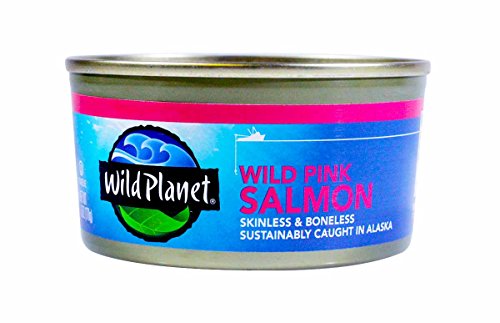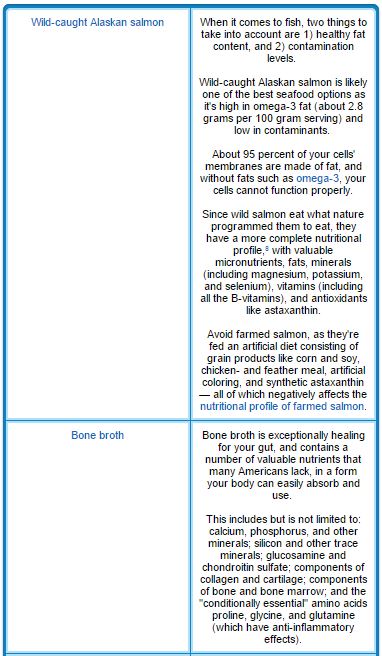By Dr. Mercola
If you’re seeking to lose excess weight, counting calories is usually less than helpful. In fact, focusing on calories could easily divert you from the real answer, which lies in optimizing your nutrition.
I’ve long advocated against counting calories. Even if you manage to shed a few pounds, you’re not going to get healthier by eating fewer cookies than you did before.
In short, if you really want to lose weight and improve your health, then you must replace empty calories and denatured foods with nutrient-rich ones.
Nutritional Value Beats Calorie Count
Fortunately, even conventional health experts are now starting to catch on, and rather than looking at calories, they suggest looking at the nutritional value of the foods you eat.
As reported by Medical Daily:1
 Wild Planet Wild Alask...
Buy New $28.98 ($0.80 / Ounce)
(as of 03:40 UTC - Details)
Wild Planet Wild Alask...
Buy New $28.98 ($0.80 / Ounce)
(as of 03:40 UTC - Details)
“An editorial published in Open Heart suggests the outdated practice of counting calories has to go…
‘Shifting the focus away from calories and emphasizing a dietary pattern that focuses on food quality rather than quantity will help to rapidly reduce obesity, related diseases, and cardiovascular risk,’ the research team said in a statement.2
‘Primary and secondary care clinicians have a duty to their individual patients and also to their local populations. Our collective failure to act is an option we cannot afford.'”
Why Counting Calories Doesn’t Work
According to the calorie myth, in order to lose weight all you need to do is follow the equation of “eat less, move more.” But this simply isn’t true.
Zoe Harcombe’s book, “The Obesity Epidemic”, is one of the most comprehensive documents I’ve ever seen that exposes the flaws of this myth. Research by Dr. Robert Lustig has also shredded this dogmatic belief, showing that not even calories from different kinds of sugar are treated identically by your body.
 BUMBLE BEE Premium Ski...
Buy New $37.35 ($0.62 / Ounce)
(as of 11:10 UTC - Details)
According to Dr. Lustig, fructose is “isocaloric but not isometabolic.” What this means is that identical calorie counts from fructose or glucose, fructose and protein, or fructose and fat, will cause entirely different metabolic effects.
BUMBLE BEE Premium Ski...
Buy New $37.35 ($0.62 / Ounce)
(as of 11:10 UTC - Details)
According to Dr. Lustig, fructose is “isocaloric but not isometabolic.” What this means is that identical calorie counts from fructose or glucose, fructose and protein, or fructose and fat, will cause entirely different metabolic effects.
Part of the problem is a fundamental error in the understanding of the law of thermodynamics. Energy is actually used up in making nutrients available in your body.
Your body also self-regulates the amount of activity you engage in, based on the available energy. If your energy stores are low, you’ll feel lethargic and unlikely to exercise, even if you know you “should.”
As noted in the featured article:3
“Results of the Action for Health in Diabetes study4 have shown that type 2 diabetes patients who adopt a lower calorie diet on top of increased physical activity have the same risk for death caused by a heart condition, even if the diet resulted in substantial weight loss.
The research team suggests that simple dietary changes that focus on macronutrients (fat, carbs, and protein) and sugar consumption rather than calorie counting can efficiently improve health outcomes.”
Seven of the Most Nutrient-Dense Foods on the Planet
You can only eat so much in a day, and if you consider your stomach to be “prime real estate,” you’d be wise to consider the nutritional value of the foods you’re putting in it. Some foods pack far more nutrients into a smaller package than others.
For example, while many equate eating salad with optimizing their diet, this is not necessarily true, depending on what’s in your salad. If lettuce and cucumbers make up the majority of that bulk, you’re getting plenty of water, yes, but few valuable nutrients.5
A recent article in Valley News6 also points out that lettuce “occupies precious crop acreage, requires fossil fuels to be shipped, refrigerated… and adds nothing but crunch to the plate.”
Authority Nutrition7 lists 11 foods densely packed with valuable nutrients. Here are my own top seven picks. For additional suggestions see the original article:
Shopping Wisely to Maximize Your Food Budget
 The Sprout House Amazo...
Buy New $20.30
(as of 08:05 UTC - Details)
The Sprout House Amazo...
Buy New $20.30
(as of 08:05 UTC - Details)
Most people use standard measures of quantity when comparing prices, but a wiser strategy might be to focus on nutrient content instead. For example, conventional USDA prime beef may be cheaper than organic grass-fed beef pound for pound, but when you take nutritional factors into account, the latter provides far better value for your money.
As noted in the Valley News article:17
“The corollary to the nutrition problem is the expense problem. The makings of a green salad — say, a head of lettuce, a cucumber, and a bunch of radishes — cost about $3 at my market. For that, I could buy more than two pounds of broccoli, sweet potatoes, or just about any frozen vegetable, which would make for a much more nutritious side dish…”
Here, I would add that if you really like salad, there are simple and very cost-effective ways to dramatically boost its nutrient content.
For example, adding a handful of sprouts, an organic egg, some raw nuts or seeds, with a drizzling of virgin olive oil on top in lieu of salad dressing would turn your nutritionally lackluster salad into a more nutrient-dense meal without adding much expense. An article18 in The Nourishing Gourmet lists 12 tips for “squeezing the most nutrient rich food from your dollar.” While a few years old, it’s as relevant today as it ever was. These tips include:
Sources and References
- 1, 3 Medical Daily August 26, 2015
- 2 Eurekalert August 26, 2015
- 4 Action for Health in Diabetes
- 5 Identifying Smart Food Choices on the Path to Healthier Diets, August 2011 (PDF)
- 6, 17 Valley News August 26, 2015
- 7 Authority Nutrition, 11 Most Nutrient Dense Foods on The Planet
- 8 Self Nutrition Data, Salmon
- 9 GreenMedInfo May 20, 2013
- 10 Medicinal and Aromatic Plant Science and Biotechnology August 2, 2009
- 11 Worldtruth.tv June 13, 2013
- 12 Lipids February 2000
- 13 Preventing Chronic Disease 2014;11:130390
- 14 Time June 6, 2014
- 15 Journal of Nutrition October 2006: 136(10); 2519-2524
- 16 Journal of Agricultural and Food Chemistry 2009, 57 (2); 471–477
- 18 Nourishing Gourmet July 7, 2008
 Maxi-Matic EGC-007 Eas...
Best Price: $12.10
Buy New $14.24
(as of 11:35 UTC - Details)
Maxi-Matic EGC-007 Eas...
Best Price: $12.10
Buy New $14.24
(as of 11:35 UTC - Details)











